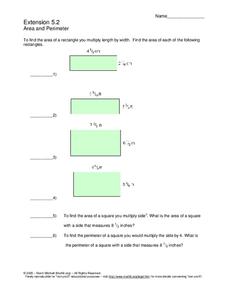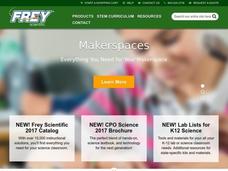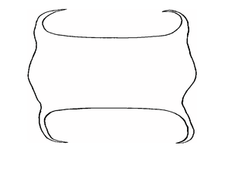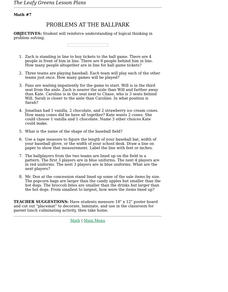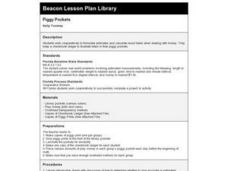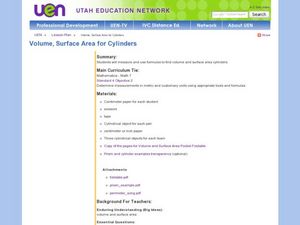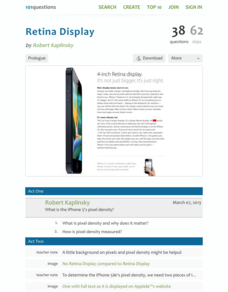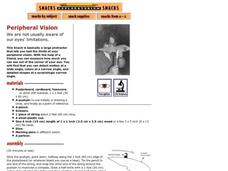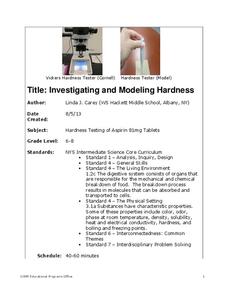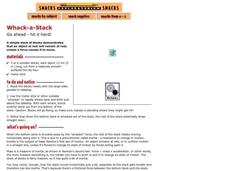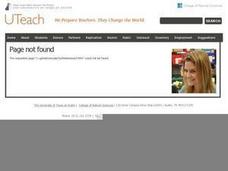Curated OER
Area and Perimeter
In this area and perimeter learning exercise, students complete a set of 6 problems, finding area of rectangles and area and perimeter of squares.
Curated OER
Using Multiplication to Solve Word Problems
Students explore math functions by solving word problems in class. In this multiplication lesson plan, students utilize colored cubes and base blocks to visualize multiplication problems. Students identify the multiplication values...
Curated OER
Wings and Othe Things
Students work in groups that are engaged in different activities at different times. They watch the video "Madagascar" and collect data pertaining to the Fish Eagle's arm spam. They work together to perform mathematical computations...
Curated OER
Natural Selection
Students observe, measure and record variations that may be due to genetic inheritance. They look at the length of seeds for germinating pinto and lima beans and measure the distance between eyes in humans. They graph and discuss the...
Curated OER
Skates
Students gain understanding of structure, characteristics, and basic needs of living things and their role in world, identify parts of skate, observe details of skate's body and skate egg case, and identify unique characteristics of skates.
Curated OER
TAKS 3rd Grade Daily Upkeep 7
For this elementary math worksheet, 3rd graders solve the four problems that focus upon measurement, fractions, and a word problem.
Curated OER
Problems at the Ballpark
Seventh graders reinforce understanding of logical thinking in problem solving.
Curated OER
Refining and Reasoning Behind Scale Drawings
Young scholars discuss accuracy and the need for it in blueprints in order to create the final project. They further refine and perfect drawings as part of the school drawing project. Students create a blueprint for the new school...
Curated OER
Piggy Pockets
Second graders determine when estimates and exact totals are appropriate in dealing with money. They simulate keeping a checking account over a period of time and keep a checkbook ledger to record deposits and expenses.
Curated OER
Volume, Surface Area for Cylinders
Seventh graders explore the concept of volume and surface area of cylinders. In this volume and surface area of cylinders instructional activity, 7th graders break cylinders into their base shapes of a circle and a rectangle. Students...
Curated OER
Orienteering II
Students name the parts of a compass and comprehend the function of each part. They define paces and tallies and use them in a real world situation. Students are shown the proper use of radio terminology. They use a map and compass to...
101 Questions
Retina Display
Learners calculate the pixel density of a specific cell phone using the concept of similarity. They use information from the cell phone's website to make their calculations and then compare their results to the posted information.
Illustrative Mathematics
Floor Plan
A multi-step problem has learners finding the actual area based on a scale drawing and then converting units at the end. Two different solution choices are listed depending on the preference on which step to start first. Both methods can...
Alabama Learning Exchange
How Old Is That Tree?
Fifth graders study environmental changes by examining the annual rings of a cross-section of a tree trunk. They access websites to complete a worksheet on the parts of a tree. They count the annual rings on a tree slice while observing...
Curated OER
Exploring Area and Perimeter
Two young scholars are blindfolded and each receives a cardboard square, one with pompoms glued around the edge and one with pompoms glued all over the surface. They identify what they feel. The class discusses perimeter and area of...
Exploratorium
Peripheral Vision
Life science learners discover the range of peripheral vision. They compare the angles at which they can detect motion, colors, and detailed shapes.
Curated OER
Busted Bubbles
Using the scientific method, and bubble gum, learners conduct a motivating experiment. After conducting a series of tests involving bubble gum, they graph and analyze their results. This is the type of activity everyone loves.
Scholastic
Discussion and Dissection of an Owl Pellet
Young scientists get the chance to dissect pellets "owl" by themselves to determine the owls environment and nourishment. This is the third part of a three-part series.
Cornell University
Investigating and Modeling Hardness
Model hardness testing with a self-designed hardness test. Young scholars rate the hardness of different types of aspirin using the Vicker's Hardness scale. They then relate hardness to the solubility of each aspirin tablet.
Exploratorium
Whack-a-Stack
Go wild as you hit a stack of wooden blocks to demonstrate Newton's first and second laws of motion. The blocks at the top of the stack stay put as you knock one at a time out of the bottom. Note, however, that you will need to visit a...
Curated OER
Vincent VanDuca
Students create art with the Manduca by placing gel on their body and letting them walk over colored paper. They discover what their footprints and movements are like. They create a piece of art by using the Manduca markings.
Curated OER
Building a Telescope
Students construct a simple refracting telescope. They calculate the magnification.
Curated OER
Tick Around the Clock
Young scholars examine and discuss the differences between clocks they are shown. Using the internet, they research how people used to tell time before clocks. They review what the long and short hand on the clock represent and practice...


